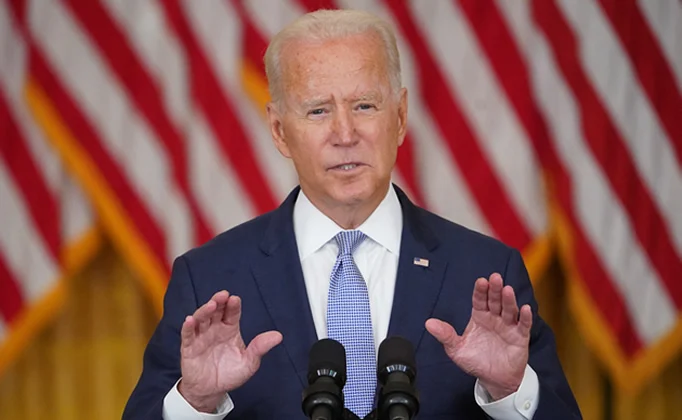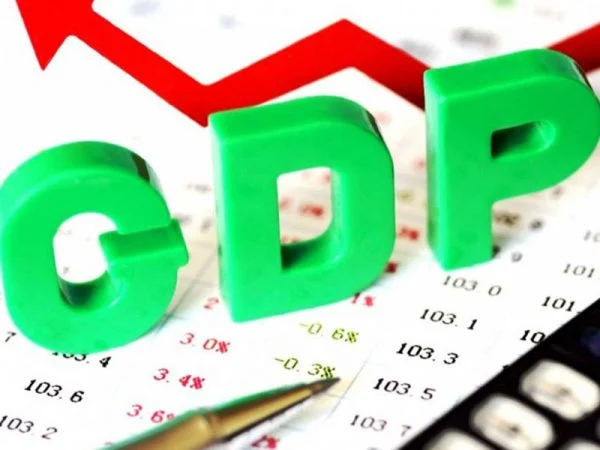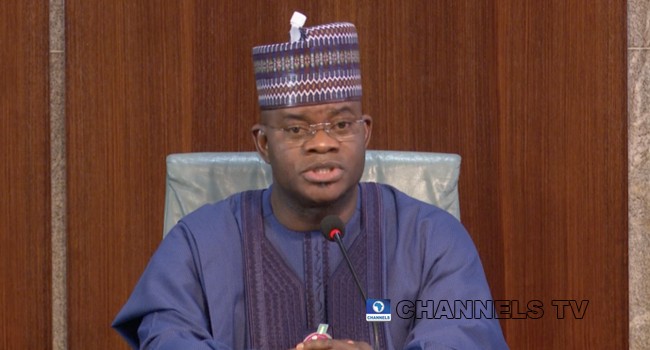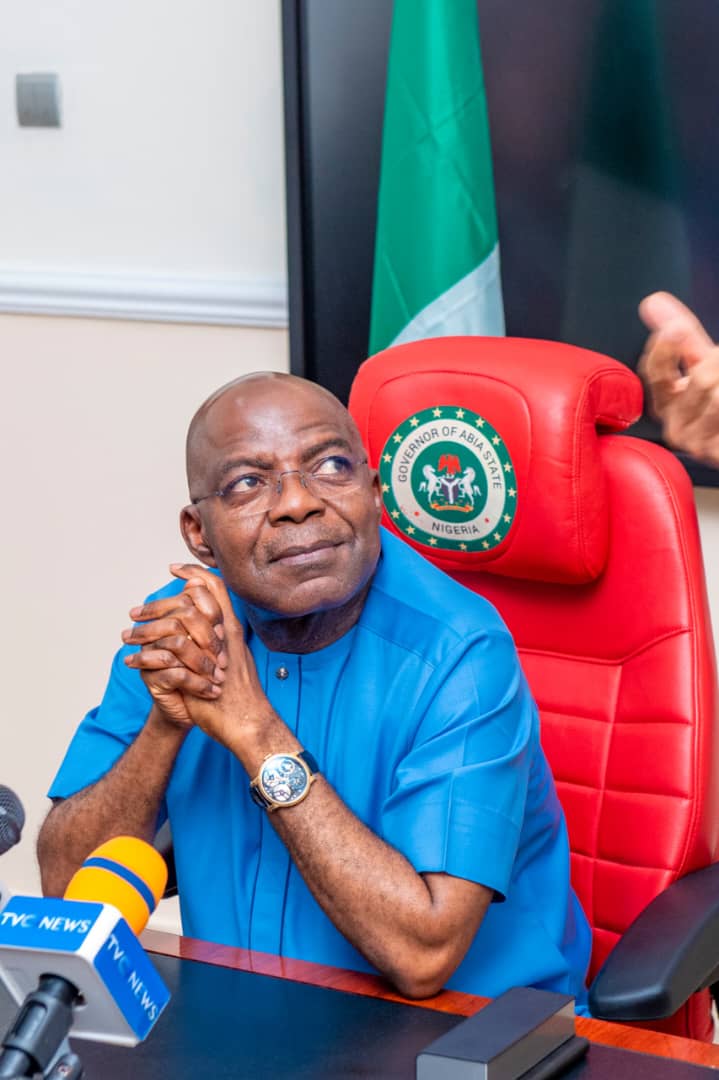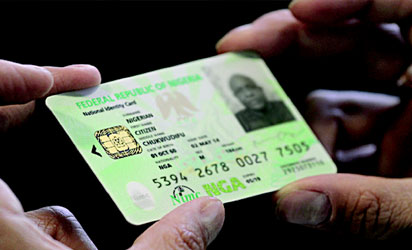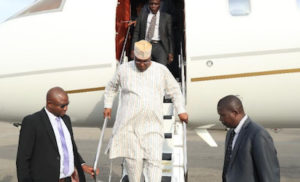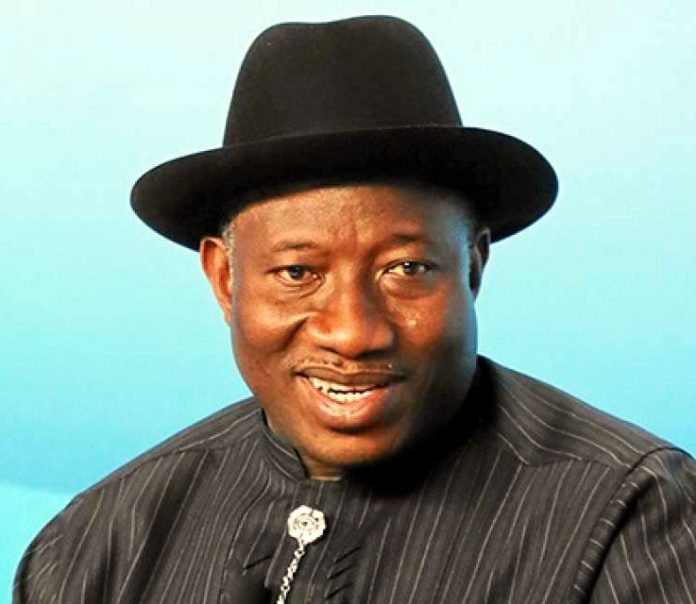Biden Takes Aggressive Posture Toward China On Asia Trip
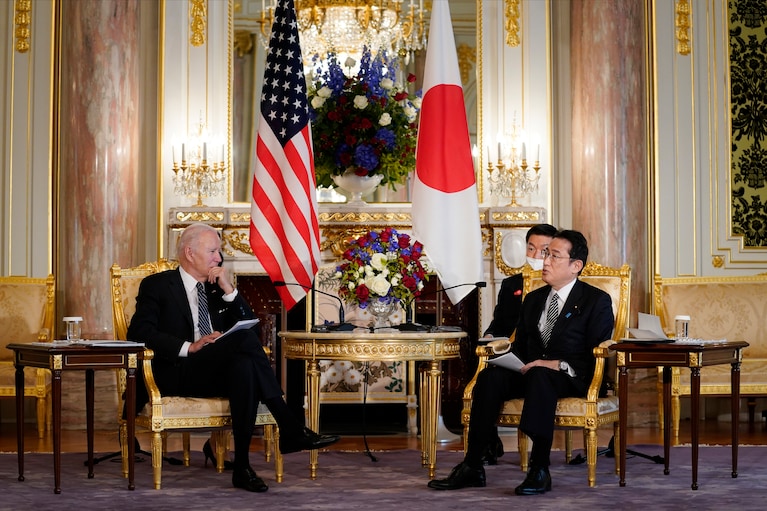
Japanese Prime Minister Fumio Kishida talks to President Biden at Akasaka Palace in Tokyo on May 23.
TOKYO — President Biden opened the second chapter of his Asia tour Monday with moves — some choreographed, others perhaps not — signaling a more confrontational approach to China on multiple fronts as his administration looks to curb the influence of the world’s most populous nation.
In a news conference Monday, Biden said the United States would defend Taiwan militarily if it came under attack by China — despite the U.S. policy of remaining vague on the subject — and that deterring Beijing was one reason Russian President Vladimir Putin must be punished for his “barbarism in Ukraine.”Later, his administration announced the outlines of a new trade framework that is meant to strengthen U.S. economic ties with other nations in the Indo-Pacific.
Biden on Tuesdaywill also participate in a meeting of the Quad, the partnership made up of the United States, India, Japan and Australia that is in part meant to counter China’s power globally.
On Taiwan, a White House official saidBiden simply had reemphasized a pledge made through a 1979 law that calls on the United States to provide Taiwan with the military means for self-defense. The United States retains a policy of strategic ambiguity toward the island, meaning it is deliberately unclear on what it would do when it comes to defending Taiwan. Both the official — who spoke on the condition of anonymity to clarify Biden’s comments — and the president said that U.S. stance has not changed.
But taken together, Monday’s rhetoric and accompanying events underscored the Biden administration’s aggressive strategy to blunt the rising influence of China — as the president drew parallels between a potential China-Taiwan conflict and the war spurred by Russia’s invasion of Ukraine.
“Russia has to pay a long-term price for that in terms of the sanctions that have been imposed,” Biden said during a news conference with Japanese Prime Minister Kishida Fumio at Akasaka Palace. “If in fact there’s a rapprochement met between … the Ukrainians and Russia, and these sanctions are not continued to be sustained in many ways, then what signal does that send to China about the cost of attempting — attempting — to take Taiwan by force?”
Though the president said he did not expect such an invasion, Biden said that China was “already flirting with danger” and that despite the United States’ “one China” policy, “that does not mean that China has the … jurisdiction to go in and use force to take over Taiwan.”
“The idea that it can be taken by force, just taken by force is just not — it’s just not appropriate,” Biden said. “It would dislocate the entire region and be another action similar to what happened in Ukraine.”
Taiwanese Foreign Ministry spokeswoman Joanne Ou said her agency “sincerely welcomed” Biden’s comments, but the Chinese ministry’s spokesman Wang Wenbin expressed his government’s “strong dissatisfaction and firm opposition” to them. Beijing claims Taiwan is an inalienable part of its territory.Advertisement
“No one should underestimate the strong determination, firm will and formidable ability of the Chinese people,” Wang said at a regular press briefing, according to the state-run Global Times.
At Monday’s summit, Biden and Kishida also reinforced their commitment to the alliance and their cooperation on responding to the Russian war.
Japan has stepped up its foreign policy since Russia’s invasion of Ukraine, which triggered a deep alarm that has accelerated Japan’s ongoing debate over defense and security policies amid China’s growing territorial threat.
Japan has been determined to show it can work with its Group of Seven counterparts to stand up to acts of force, out of fear that the lack of a strong response risks emboldening China’s growing assertiveness and the worsening of relations between China and Taiwan. Japan is now moving toward increasing its defense budget, which is a sensitive topic because of country’s militaristic past.Advertisement
The world’s third-largest economy, Japan has taken uncharacteristically swift steps to join Western allies in financially pressuring Russia and aiding Ukraine. Last week, Tokyo committed an additional $300 million in short-term support to Ukraine, on top of the more than $200 million it had already pledged. Japan accepted more than 1,000 people fleeing Ukraine — an eye-popping figure for a country that has historically been unfriendly to refugees.
Kishida, elected prime minister in the fall, has received high marks at home for his decisions — 71.2 percent of the public supports his response to the Russian invasion, according to a survey released Sunday by Kyodo News, a Japanese outlet.
Part of the U.S.-Japanese response to China’s rise is the launch of the Indo-Pacific Economic Framework, the contours of a new agreement that is designed to be a bulwark against China. The administration says it improves on the political and substantive shortcomings of the Trans-Pacific Partnership, negotiated during the Obama administration when Biden was vice president.Advertisement
The dozen countries in the new pact with the United States are Australia, Brunei, India, Indonesia, Japan, South Korea, Malaysia, New Zealand, the Philippines, Singapore, Thailand and Vietnam. The countries account for 40 percent of global gross domestic product, according to the administration.
“It is by any account the most significant international economic engagement that the United States has ever had in this region,” Commerce Secretary Gina Raimondo said.
The intended audience of the announcement was clear, even though Biden, during the launch event Monday, did not specifically name China. The representatives from the other 12 nations were also careful not to single out the country in their own remarks.
Administration officials have pointed to economic data showing the U.S. economy had grown faster than China’s for the first time in four decades as proof that partnering with the United States would be a more alluring option for other Indo-Pacific nations.Advertisement
“Our view is that this is not about a zero-sum game with China,” national security adviser Jake Sullivan said. “It’s not about forcing countries to choose. But it is about offering a value proposition that we think countries are taking extremely seriously.”
But many officials throughout Asia, including in Japan, are wary of the U.S. rollout of its new economic proposal. Japanese officials have said they are relieved to see the United States reassert itself economically in the Indo-Pacific region but remain frustrated about President Donald Trump’s 2017 pullout from the Trans-Pacific Partnership.
Although it was Trump who formally withdrew the United States from that agreement, it also lacked support from both parties on Capitol Hill and would not have been ratified. It’s unclear whether Congress would have to greenlight any eventual agreements created throughthis new trade framework.Advertisement
Standing next to Biden during Monday’s news conference at Akasaka Palace, Kishida repeatedly stressed Japan’s wish for the United States to rejoin the TPP. Meanwhile, many Asia-Pacific countries are already participating in a free-trade agreement involving China, called the Regional Comprehensive Economic Partnership.
The framework released by the White House and the dozen other countries Monday does not include specific commitments or requirements of what each nation has to do to reap the benefits
The administration has also faced questions about why Taiwan was excluded from the initial list of participating countries. Last week, a bipartisan majority of 52 senators wrote to Biden, pressing him to ensure the self-governing island and U.S. trading partner was a part of the new framework and said doing so was an economic and military imperative.Advertisement
Excluding Taiwan “would significantly distort the regional and global economic architecture, run counter to U.S. economic interests, and allow the Chinese government to claim that the international community does not in fact support meaningful engagement with Taiwan,” stated the letter, which was written by the two leaders of the Senate Foreign Relations Committee.
Sullivan said the administration will pursue “deeper” bilateral trade relations with Taiwan rather than including it in Tuesday’s framework because doing so “puts us in the best position for us to be able to enhance our economic partnership with Taiwan and also to carry IPEF forward with this diverse range of countries.”
To bring countries from Southeast Asia, or the Association of Southeast Asian Nations (ASEAN), fully on board, the United States must provide more specifics about its vision, said Fukunari Kimura, economics professor at Keio University in Tokyo and chief economist of the Economic Research Institute for ASEAN and East Asia.Advertisement
Market access — lowering the barrier for trade activity with the United States — was an important incentive to convince Southeast Asian countries to join the TPP.
“Together with like-minded countries, the U.S. must clearly specify the items that the IPEF would cover,” Kimura said. “To make the IPEF fly, it must secure the involvement of ASEAN. Otherwise, it would be a minor extension of a security gathering with a limited number of countries in the region. … The IPEF must provide a good alternative incentive for them if market access cannot be included. The ASEAN economy is still growing with international production networks.”
Sen. Bill Hagerty (R-Tenn.), the U.S. ambassador to Japan under the Trump administration, also pointed to the lack of provisions in the new trade framework to boost market access, even as allies in the region are “eager to see more U.S. economic leadership.”
On Tuesday, Biden’s final day of his Asia trip, he is scheduled to spend much of the day meeting with other leaders from the Quad nations.
The four democracies share security and economic interests, but the grouping exists for reasons that mirror the purpose of Biden’s first Asia trip as president: to counter China’s growing military and economic might.
Speaking shortly after he was sworn in as Australia’s 31st prime minister, Anthony Albanese, who will participate in the Quad summit, said the meeting will send a message of “continuity in the way that we have respect for democracy and the way that we value our friendships and long-term alliances.”
